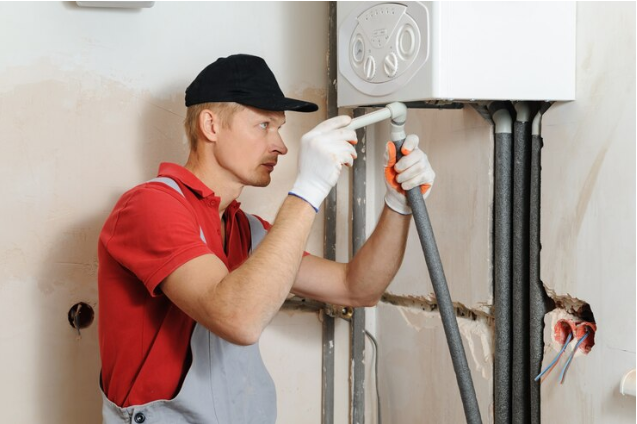As a homeowner in New Jersey, ensuring your home’s heating system is efficient, reliable, and well-maintained is crucial, especially with the harsh winters the state is known for. A properly installed boiler plays a vital role in keeping your home warm and energy-efficient. Whether you’re building a new home or replacing an old heating system, choosing the right boiler and understanding the installation process is key to enjoying comfortable indoor temperatures while keeping energy costs down. In this blog, we’ll cover essential considerations for homeowners looking to invest in boiler installation services in New Jersey.
1. Assessing Your Home’s Heating Needs
Before selecting a boiler, you need to assess the specific heating requirements of your home. Every house is different, and factors such as the size of the property, the number of rooms, insulation quality, and local climate conditions affect your heating needs. When choosing boiler installation services in New Jersey, it’s important to work with a professional who will thoroughly assess your home’s layout and determine the ideal boiler size and type for efficient heating.
- Size of the Home: Larger homes may require boilers with higher capacity to ensure consistent warmth in every room.
- Insulation Quality: Homes with poor insulation will require boilers that work harder to maintain the desired temperature, leading to higher energy costs.
- Heat Output: Boiler output is measured in BTUs (British Thermal Units). A professional can help you select a boiler with the right output for your home’s needs.
2. Choosing Between Traditional and Combination Boilers
When considering boiler installation services in New Jersey, one of the main decisions you’ll need to make is whether to go with a traditional boiler or a combination boiler (combi boiler). Each type of boiler has its pros and cons, depending on your household’s specific heating and hot water needs.
- Traditional Boilers: These are often larger systems that work with a hot water tank. They can provide steady heating and hot water simultaneously, which is ideal for larger homes or families with higher water consumption.
- Combination Boilers (Combi Boilers): These boilers do not require a separate hot water tank, making them more compact. They heat water on demand, which can be more energy-efficient for smaller households or homes with limited space.
3. Energy Efficiency and Boiler Ratings
When considering a new boiler, energy efficiency should be one of your top priorities. Newer boilers are designed to be much more energy-efficient than older models, which can lead to significant savings on your energy bills. Boiler installation services in New Jersey often offer a variety of options, from standard models to high-efficiency units, such as condensing boilers. Understanding the efficiency rating of each system is key to making the best decision.
- AFUE Rating (Annual Fuel Utilization Efficiency): This rating measures the boiler’s overall efficiency, with higher percentages indicating better energy efficiency. Look for boilers with a rating of 85% or higher to ensure reduced energy costs.
- Condensing Boilers: These boilers capture and reuse heat that would otherwise be lost during the heating process. They typically have an efficiency rating of 90% or higher, making them an excellent choice for energy-conscious homeowners.
4. Understanding Installation Costs and Budgeting
While the initial cost of a new boiler and installation might seem significant, it’s essential to view it as a long-term investment. The right boiler can help you save on energy bills and avoid frequent repairs. When evaluating boiler installation services in New Jersey, ensure you understand the full cost breakdown, including the price of the boiler, labor fees, and any additional components that may be needed.
- Initial Costs: High-efficiency boilers may have a higher upfront cost, but they often result in lower long-term energy expenses.
- Labor and Installation Fees: These can vary depending on the complexity of the installation, especially if you are upgrading from an older system or need additional plumbing work.
It’s important to choose a reliable contractor who provides a detailed estimate of the costs before beginning the installation process.
5. Ensuring Proper Ventilation
Proper ventilation is critical to the safety and efficiency of your boiler system. Boilers produce combustion gases, including carbon monoxide, which need to be vented out of the home safely. Depending on the type of boiler you install, different ventilation systems may be required.
- Flue Systems: These systems are essential for removing combustion gases from your home. Make sure the boiler installation service you choose understands local building codes regarding flue systems to ensure safety.
- Sealed Combustion Boilers: These systems are safer because they draw air from outside the home, which reduces the risk of indoor air contamination.
6. Long-Term Maintenance and Support
Even the most efficient boilers require regular maintenance to operate optimally. Routine maintenance helps prevent unexpected breakdowns, extends the lifespan of the boiler, and keeps energy costs under control. When selecting boiler installation services in New Jersey, inquire about ongoing support and maintenance plans.
- Annual Maintenance Checks: These checks are essential to ensure that the boiler is functioning efficiently and safely. They typically involve inspecting the boiler’s components, cleaning parts, and ensuring proper ventilation.
- Emergency Repairs: Choose a service provider that offers emergency repair services to handle any unexpected boiler issues quickly and efficiently.
7. Working with a Trusted Installer
Boiler installation is a complex process that requires the expertise of a licensed professional. Improper installation can lead to a host of problems, including inefficient heating, higher energy costs, and safety risks. It’s essential to work with a trusted provider of boiler installation services in New Jersey who has a proven track record of delivering high-quality installations.
- Certified Technicians: Make sure your installer is licensed and certified to work with the type of boiler you’re installing.
- Positive Reviews: Look for companies with strong customer reviews and a reputation for reliability and professionalism.
Conclusion
When it comes to boiler installation services in New Jersey, there are several key considerations that homeowners must keep in mind to ensure they select the right system for their needs. From understanding the different types of boilers and their energy efficiency ratings to planning for proper installation costs and long-term maintenance, making an informed decision will lead to years of comfort, reduced energy bills, and peace of mind.
By partnering with a trusted provider of boiler installation services in New Jersey, you can confidently upgrade your home’s heating system and enjoy the benefits of reliable warmth and energy efficiency.




